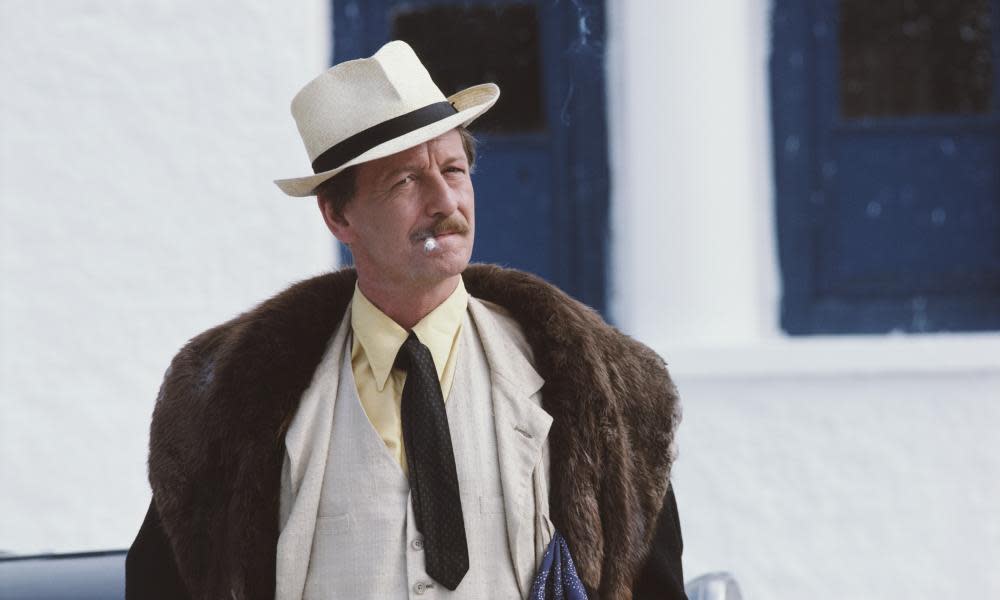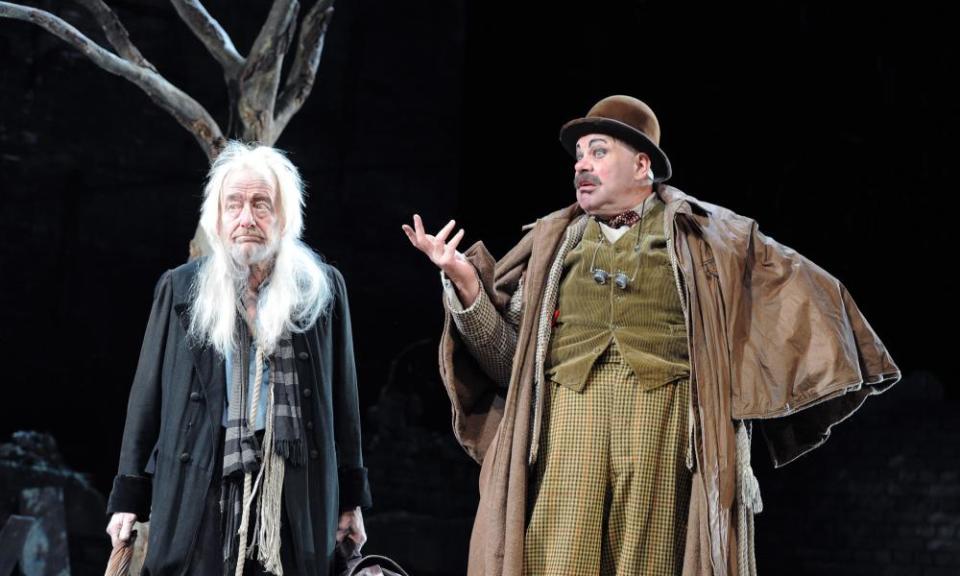Ronald Pickup obituary

The art of transformation is one of the great mysteries of acting, for the best actor is both recognisable as himself and convincing as someone else. Ronald Pickup, who has died aged 80, was an actor so luminous, so transparent, that you saw straight through him to the character he played, and out the other side.
Whether he was playing a bedraggled Russian aristocrat in Fortunes of War (1987) on television, with Kenneth Branagh and Emma Thompson, or the ageing “ladies’ man” Norman Cousins in John Madden’s Best Exotic Marigold Hotel (2012), he always conveyed a sense of his own innate humanity while fully inhabiting those roles.
Tall and lean, with a gimlet eye and a clear, quick tenor voice, he looked as much like the archbishop of Canterbury, Geoffrey Fisher, who crowned Queen Elizabeth in The Crown (2016) as he did a mustachioed Neville Chamberlain in Darkest Hour (2017) with Gary Oldman as Churchill. But he did so with minimal makeup; just something in the eyes, the bearing and the set of his facial muscles.
This intelligence and luminosity marked his stage work, too. He was one of many actors who graduated from small roles to leading parts at the National Theatre at the Old Vic under Laurence Olivier. These ranged from a wonderful Rosalind in As You Like It in the all-male “flower power” 1967 production by Clifford Williams (Anthony Hopkins was a notably butch and stroppy Audrey) to the tubercular younger son of James Tyrone, played unforgettably by Olivier, in Michael Blakemore’s 1971 production of Eugene O’Neill’s Long Day’s Journey Into Night.
Related: Ronald Pickup: a theatrical great from a golden generation
He returned to the National’s new home on the South Bank in 1977 as a febrile “lean and hungry” Cassius to John Gielgud’s Julius Caesar and in 1997, as a blazered alcoholic commissioning agent for Lloyd’s of London besotted with Judi Dench as a widowed actor, in David Hare’s superb “defence of the theatre” play Amy’s View; he sailed on with Dench, and Samantha Bond as her daughter, to the West End and Broadway.
Pickup was a quiet and thoughtful man, passionately fond of music and painting. He was born in Chester, one of two sons of Eric Pickup, a college lecturer in English and French, and his wife, Daisy (nee Williams). Ronald was educated at the King’s school, Chester – he would open the school’s Vanbrugh theatre, named for another old boy, John Vanbrugh, the playwright and architect, in 2011 – and took a degree in English at Leeds University. He then trained for the stage at Rada.
He graduated in 1964. In the same busy year he married a fellow student, Lans Traverse; made a professional debut as Sir John Friendly in Vanbrugh’s Virtue in Danger at the Phoenix, Leicester; and played a physician in the Reign of Terror story in Doctor Who with William Hartnell. He completed the year at the Royal Court as Octavius in Lindsay Anderson’s production of Julius Caesar, which propelled him immediately into the National in 1965.

At first, he was confined to small parts. He came of age at the Royal Court later in 1965 under the direction of William Gaskill, who cast him as the poet Shelley in Ann Jellicoe’s play of that title, one of the baby-stoning lads (with Dennis Waterman and Tony Selby) in Edward Bond’s notorious Saved, and as Sir Oliver Kix in Middleton’s city comedy A Chaste Maid in Cheapside.
Rejoining the National, he was instantly promoted as the wicked Don John in Franco Zeffirelli’s festive Much Ado About Nothing (with Maggie Smith and Robert Stephens); the servant Jeremy in a glorious Peter Wood production of Congreve’s Love for Love; the melancholic Don Armado in Olivier’s beautiful production of Love’s Labour’s Lost; Tusenbach in Olivier’s staging of Three Sisters; and Aimwell in Gaskill’s definitive version of Farquhar’s The Beaux’ Stratagem. He touched greatness as Richard II in 1972 and shared the stage with Olivier’s final extraordinary appearance (as a Scottish trade unionist) in Trevor Griffiths’ The Party (1973), a bristling dissection of a group of political leftwingers.
The Olivier Three Sisters was filmed, and Pickup subsequently appeared, not all that prominently, in The Day of the Jackal (1972), Ken Russell’s Mahler (1974) and Tony Richardson’s Joseph Andrews (1976). On television, his arts celebrity roster included George Orwell, Verdi, Nietzsche, Stravinsky, Stanislavski and Randolph Churchill. He scored two successes in quality sitcom series: Stanley Price’s Moving (1985), opposite Penelope Keith reprising her role in the original 1981 stage play; and as a rogue husband decamping with a younger model in Behaving Badly (1989), co-starring Dench and Frances Barber.
His great classic roles in the 1980s – Willie Mossop in Hobson’s Choice (with Arthur Lowe), Astrov in Uncle Vanya (with Donald Sinden and Frances de la Tour), Allmers in Ibsen’s Little Eyolf (with Diana Rigg), Gaev in The Cherry Orchard translated by Michael Frayn (with Dench as Ranevskaya, direction by Sam Mendes) – were at the Lyric, Hammersmith, or in the West End. But he returned to contemporary drama in David Auburn’s Proof at the Donmar Warehouse in 2002, as the Lear-like father of Gwyneth Paltrow, directed by Madden; Hopkins, his old friend and contemporary at Rada, played his role in the subsequent movie.
Perhaps that is why Madden called him up for The Best Exotic Marigold Hotel. Whatever the reason, this box-office smash was an excellent payoff, alerting the nation anew to his insinuating talent; as indeed was his acclaimed 2009 appearance as the lyrically enslaved, long-haired Lucky in Sean Mathias’s “theatrical” revival of Beckett’s Waiting for Godot at the Haymarket. He had made notable inroads on Beckett in the one-act Play at the Royal Court in 1976 (buried up to his neck in an urn alongside his similarly incarcerated wife and mistress – Anna Massey and Penelope Wilton) and in Ghost Trio on television (1977, with Billie Whitelaw).
His Lucky was a brilliant tour de force in its rapid repository of old memories, as it should be, tethered like a dog on a leash by Simon Callow’s riotous Pozzo to the bemusement of Ian McKellen’s Estragon and Patrick Stewart’s Vladimir. He repeated the role on tour, and back at the Haymarket in 2010, with Roger Rees replacing Stewart and Matthew Kelly Callow.
He had opened the Rose, Kingston, for Peter Hall in 2008 as a modestly inflected old professor in Uncle Vanya and made his last stage appearance as Mazzini Dunn in a revival at the Chichester festival theatre of Shaw’s Heartbreak House in 2012 alongside Derek Jacobi as Shotover.
A late flurry of screen appearances included a 2014 cameo in Coronation Street, Len Sheldon, a pensioner arranging a birthday party in the Rovers Return; The Second Best Exotic Marigold Hotel (2015); Sir Michael Reresby in Downton Abbey (2015), the estate owner who refuses the sly valet Barrow (Robert James-Collier) a job; and as the judge in The Happy Prince (2018), Rupert Everett’s sensationally good movie about the last days of Oscar Wilde.
The award in 2012 of an Hon DLitt by the University of Chester, the former teachers’ training college where his father had lectured, meant a great deal to him.
He is survived by Lans, and by their children, Simon and Rachel.
• Ronald Alfred Pickup, actor, born 7 June 1940; died 24 February 2021


